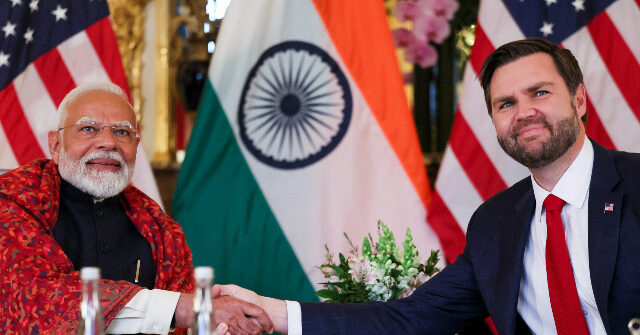Indian Prime Minister Narendra Modi said on Tuesday that he had a “wonderful meeting” with United States Vice President JD Vance.
Modi said he was “delighted” to join the Vances in celebrating the “joyous birthday of their son, Vivek.”
“Prime Minister Modi was gracious and kind, and our kids really enjoyed the gifts. I’m grateful to him for the wonderful conversation,” Vance responded.
Usha Vance, America’s first Indian-American and Hindu second lady, has been a big hit with Indian media. Her parents emigrated from India in the 1970s and became scholars of engineering and molecular biology in San Diego. The Vances have three young children, Ewan, Vivek, and Mirabel, ages 7, 4, and 2.
Vice President Vance met with Modi in Paris on the sidelines of an artificial intelligence (A.I.) summit co-hosted by France and India. Vance used his first overseas trip as vice president to deliver a strong statement about America’s intention to lead the world in A.I. research in the years ahead.
“The Trump administration will ensure that the most powerful A.I. systems are built in the U.S. with American design and manufactured chips,” Vance pledged at the summit.
“Just because we are the leader doesn’t mean we want to or need to go it alone,” he added, proceeding to needle the Europeans about their stifling regulatory environment and heavy online censorship.
Vance and Modi discussed American support for India to diversify its energy supply, specifically by replacing India’s heavy purchases of fossil fuels from Russia with American nuclear energy technology.
One of the major impediments to this realignment is an Indian law, the 2010 Civil Liability for Nuclear Damage Act, that scares off foreign investors by imposing huge financial risks upon them in the event of accidents and project setbacks. Another Indian law, the 1962 Atomic Energy Act, bans private investment in nuclear power plants.
India floated the idea of amending these laws on Saturday, opening a path for American nuclear power to cover India’s need for another 100 gigawatts of nuclear energy over the next twenty years. Nuclear energy is far more environmentally sensitive than importing Russian energy products, and far less politically explosive.
India currently has about 8 gigawatts of nuclear capacity, with another 12 gigawatts scheduled to come online by 2032. Modi is expected to discuss the nuclear transition further when he meets with President Donald Trump in Washington on Thursday.
Modi and Trump have long enjoyed a warm personal relationship, but Trump has been highly critical of India’s trade policies. Modi’s government is seeking to win Trump’s favor and avoid tariffs by lowering its own tariffs, buying more American oil, and accepting deported illegal migrants.
Read the full article here
